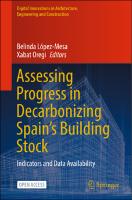Assessing Progress in Decarbonizing Spain’s Building Stock
Indicators and Data Availability
| dc.contributor.editor | López-Mesa, Belinda | |
| dc.contributor.editor | Oregi, Xabat | |
| dc.date.accessioned | 2024-04-16T08:18:05Z | |
| dc.date.available | 2024-04-16T08:18:05Z | |
| dc.date.issued | 2024 | |
| dc.identifier | ONIX_20240416_9783031518294_41 | |
| dc.identifier | OCN: 1430327550 | |
| dc.identifier.uri | https://library.oapen.org/handle/20.500.12657/89945 | |
| dc.description.abstract | This open access book delves into the topic of monitoring the effectiveness of building renovation policies within the European Union (EU) using indicators. Given the substantial environmental impact of existing buildings on energy consumption and greenhouse gas emissions, decarbonizing them is imperative for achieving climate neutrality in Europe. The use of indicators for monitoring decarbonization progress and evaluating policies emerges as a valuable tool, ensuring the efficiency, effectiveness, and alignment of building renovation policies with broader sustainability and climate objectives. Additionally, this approach facilitates evidence-based decision-making, promotes accountability by Member States (MSs), supports the realization of long-term goals, and actively involves the public in these vital initiatives. The European Commission is actively engaged in this realm, releasing a framework of optional indicators in 2019 and subsequently refining it during the review of the Energy Performance of Buildings Directive. The evolving framework seeks to encompass both mandatory and optional indicators, posing greater challenges for EU MSs in monitoring the impact of their national building renovation policies and the progress of decarbonizing their building stocks. This book offers insights into these developing indicator frameworks, assesses the availability and quality of data in the case of Spain, and suggests areas of improvement and innovative approaches using emerging technologies to enhance data. The target audience includes diverse stakeholders such as central government administrations, regional and municipal authorities, data-collecting institutions, urban planners, researchers, and citizens interested in comprehending the impact of building renovation. By addressing this broad audience, the book aims to foster a more inclusive and well-informed discussion on building renovation and the decarbonization of the European building stock. | |
| dc.language | English | |
| dc.relation.ispartofseries | Digital Innovations in Architecture, Engineering and Construction | |
| dc.subject.classification | thema EDItEUR::T Technology, Engineering, Agriculture, Industrial processes::TN Civil engineering, surveying and building::TNK Building construction and materials::TNKX Conservation of buildings and building materials | |
| dc.subject.classification | thema EDItEUR::T Technology, Engineering, Agriculture, Industrial processes::TH Energy technology and engineering::THV Alternative and renewable energy sources and technology | |
| dc.subject.classification | thema EDItEUR::R Earth Sciences, Geography, Environment, Planning::RN The environment::RNU Sustainability | |
| dc.subject.other | building renovation | |
| dc.subject.other | buildings energy savings | |
| dc.subject.other | decarbonization indicators | |
| dc.subject.other | building stock indicators | |
| dc.subject.other | renovation cost-effectiveness | |
| dc.subject.other | energy poverty indicators | |
| dc.title | Assessing Progress in Decarbonizing Spain’s Building Stock | |
| dc.title.alternative | Indicators and Data Availability | |
| dc.type | book | |
| oapen.identifier.doi | 10.1007/978-3-031-51829-4 | |
| oapen.relation.isPublishedBy | 6c6992af-b843-4f46-859c-f6e9998e40d5 | |
| oapen.relation.isFundedBy | 533e59bc-7323-4d87-ac37-067b16b07c44 | |
| oapen.relation.isbn | 9783031518294 | |
| oapen.relation.isbn | 9783031518287 | |
| oapen.imprint | Springer Nature Switzerland | |
| oapen.pages | 346 | |
| oapen.place.publication | Cham | |
| oapen.grant.number | [...] |

